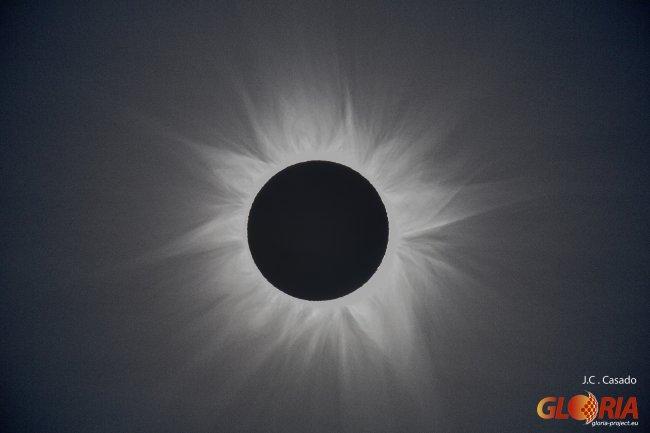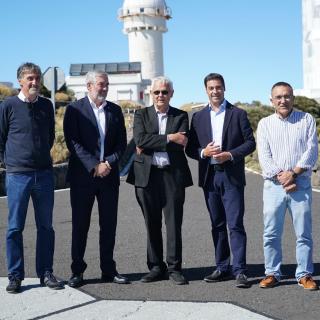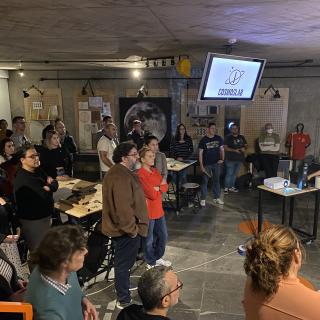A group of astronomers, made up of STARS4ALL team members, will travel to Palu (Sulawesi island, Indonesia) to observe and broadcast the next total solar eclipse. The first connection will take place at 23:25 hours Universal Time (UT, timezone of Canary Islands, one hour more in the Peninsula) of 8th March and the whole phenomenon can be followed through the web sky-live.tv.
STARS4ALL is a Collective Awareness Platform for Promoting Dark Skies in Europe through Light Pollution Initiatives (LPIs). LPI are local or global working groups who fight against light pollution. Every citizen will be able to contribute and participate in one or several LPIs, through Citizen Actions (CAs).
Why have astronomers chosen such a remote location for the live broadcast?
Miquel Serra-Ricart, the leader of Shelios 2016 -Francisco Sánchez expedition- said “Observing this eclipse will be very difficult, since the shadow will only touch land in the large Indonesian archipelago, where there is a high probability of clouds due to its equatorial location”. To choose the correct location, Serra-Ricart had to consider not only the visibility of the eclipse, but also the best chance of good weather, the quality of the roads and the safety of the expedition.
Miquel, an astronomer at the Astrophysics Institute of the Canary Islands (Instituto de Astrofísica de Canarias, IAC), is a highly experienced eclipse observer - this will be his 13th expedition as leader. The first was in 1998, in the middle of the Atlantic: "No two eclipses are the same and there are always unexpected new phenomena". The data obtained will also be made available to schools for educational activities.
STARS4ALL is a project funded by the European Union H2020 Programme under agreement number 688135. STARS4ALL is composed of 8 institutions (UPM, CEFRIEL, SOTON, ECN, ESCP Europe, IAC, IGB, UCM) from 6 countries.
The Tadulako University (Palu, Indonesia) will participate in the broadcast. Three Spanish supercomputing centers Centro Extremeño de Tecnologías Avanzadas (CETA-CIEMAT), Consorci de Serveis Universitaris de Catalunya (CSUC) and Instituto de Astrofísica de Canarias (IAC) will collaborate in redistributing the online broadcast (sky-live.tv).
The solar eclipse will be broadcast from Palu (Indonesia). The duration of the event will be 2h 33m (from 23:27 of 8 March to 2:00 UT of 9 March) and explanations in Spanish and Engllish will be offered. The broadcasting will last 15 minutes, starting with the beginning of the partiality, first contact, totality, and second and third contact (see the table below). Two connections will take place:
Connection 1: beginning of the partiality (5 minutes).
8 March, from 23:25 to 23:30 UT (9 March, 00:25 – 00:30 Central European Time –CET)
Connection 2: totality, 2nd and 3rd contact (10 minutes).
9 March, from 00:32 to 00:42 UT (01:32 – 01:42 CET)
- The STARS4ALL project website: http://www.stars4all.eu/
- The educational activities for schools will be available at: https://docs.google.com/document/d/1CFfSR6KQkX6wmIeuSMM59p83F4RrUpQkb3JM_JhVYH8/edit?usp=sharing / http://astroaula.net/recursos-didacticos/actividades/eclipse-atmosfera/
- Broadcast information: https://docs.google.com/document/d/1Dw34dt7fiCW9zCyx-9lbk0L9kXuap7ljQbXTkrWTAC4/edit?usp=sharing
- Images in high resolution of previous total solar eclipses: https://www.flickr.com/photos/65131760@N06/sets/72157634767436442/
- Videos of previous total solar eclipses: https://www.youtube.com/playlist?list=PL6oc5e7lSjeLHZ24RZ1ymjiOjKXZFl1Wp
- Expedition Blog:http://journal.shelios.com/
- Interactive map of the eclipse:
http://eclipse.gsfc.nasa.gov/SEgoogle/SEgoogle2001/SE2016Mar09Tgoogle.html
Duration of the total solar eclipse: 2 minutes
Contacts | Time (UT) | CET | Local | Alt | Azi |
Start partiality (C1) : | 23:27:52 (8th) | 00:27:52 | 7:27:52 | 19.2° | 94.4° |
Start total solar eclipse (C2) : | 00:37:52 | 01:37:52 | 8:37:52 | 36.7° | 94.8° |
Maximum eclipse: | 00:38:51 | 01:38:51 | 8:38:51 | 36.9° | 94.9° |
End of the total eclipse (C3) : | 00:39:50 | 01:39:50 | 8:39:50 | 37.2° | 94.9° |
End of the partial eclipse (C4) : | 02:00:36 | 03:00:36 | 10:00:36 | 57.3° | 94.7° |



